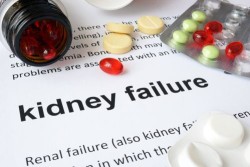Top Class Actions’s website and social media posts use affiliate links. If you make a purchase using such links, we may receive a commission, but it will not result in any additional charges to you. Please review our Affiliate Link Disclosure for more information.
The FDA is currently investigating whether or not changes to these drugs’ labels are necessary but many consumers are reacting by filing diabetes medication kidney failure lawsuits.
Plaintiffs involved in these lawsuits hope to gain some kind of financial compensation for the physical, emotional, and financial pain they have suffered because of the diabetes medication side effects.
On top of an increased risk of kidney failure, the FDA reports that diabetes medications may also increase a diabetic patient’s risk of ketoacidosis.
Diabetic ketoacidosis (DKA) is a life-threatening condition that develops when a body cannot get the sugar necessary for energy because of a lack of insulin. Given that ketoacidosis is already a risk for diabetes patients, the increased risk could be extreme.
The diabetes medication implicated in the FDA’s warning belong to a class of drugs known as sodiumglucose cotransporter2 (SGLT2) inhibitors.
Diabetes Medications Increase Kidney Failure Risk
SGLT2 inhibitors that have been associated with an increased risk of kidney failure, as well as other side effects, include the following diabetes drugs:
- Invokana (canagliflozin)
- Invokamet (canagliflozin and metformin)
- Farxiga (dapagliflozin)
- Xigduo XR (dapagliflozin and metformin extended-release)
- Jardiance (empagliflozin)
- Glyxambi (empagliflozin and linagliptin)
The SGLT2 inhibitor diabetes medications were approved by the FDA to lower the blood sugar of adults with type-2 diabetes. The medications are not meant to be the only treatment for this disease and instead should be taken along with a healthy diet and exercise.
SGLT2 inhibitors such as those listed above remove glucose from the body by way of the kidneys. Kidneys, when working naturally, reabsorb filtered glucose from the blood and return it to the bloodstream. It is an SGLT2 inhibitor’s job to stop this reabsorption, which ultimately lowers the body’s levels of glucose.
Diabetes Medication Lawsuits
Kidney failure lawsuits filed against the manufacturers of these SGLT2 inhibitors allege that the drugs increase a patient’s risk of kidney failure, among other complications like ketoacidosis or in some cases even cardiovascular emergencies.
According to diabetes medication lawsuits, if the manufacturers of these drugs had adequately warned the public and the medical community of the increased risk of kidney failure linked with their products, patients would not have used these medications and would have avoided serious injury.
The diabetes drugs lawsuits allege that patients would have chosen a substitute, non-SGLT2 inhibitor medication, rather than take on an increased risk of complications like kidney failure.
Diabetes medication lawsuits further claim that, even if plaintiffs did choose to use an SGLT2 inhibitor, a proper warning from the drug’s manufacturer would allow them to be monitored for signs of serious complications.
Diabetes Drug Kidney Failure
Kidney failure is a serious side effect of these SGLT2 diabetes medications that occurs when kidneys stop functioning.
Without proper kidney function, the waste products, fluids, and electrolytes that would normally be filtered and regulated by the kidneys build up in the body. This build up can result in weakness, shortness of breath, lethargy, confusion, abnormal heart rhythms, and even sudden death.
If you have taken and SGLT2 diabetes medication and have experienced one or more of the above symptoms of kidney failure, you should seek medical help.
Sometimes, simple cessation of the medication can lead kidney function to return to normal. Other times, further treatment is necessary. Kidney failure can be life threatening, so it is important to be aware of these symptoms.
A growing number of people are pursuing diabetes medication lawsuits after suffering from various side effects including kidney failure, as well as ketoacidosis or heart problems.
If you or someone you know has suffered from significant side effects, including kidney failure, from one of these or similar diabetes medications, you may be able to file a diabetes medication side effects lawsuit.
Pursuing a lawsuit could result in financial compensation that would help with medical expenses and lost wages, as well as emotional and physical suffering.
In general, diabetes medication lawsuits are filed individually by each plaintiff and are not class actions.
Do YOU have a legal claim? Fill out the form on this page now for a free, immediate, and confidential case evaluation. The attorneys who work with Top Class Actions will contact you if you qualify to let you know if an individual lawsuit or class action lawsuit is best for you. Hurry — statutes of limitations may apply.
ATTORNEY ADVERTISING
Top Class Actions is a Proud Member of the American Bar Association
LEGAL INFORMATION IS NOT LEGAL ADVICE
Top Class Actions Legal Statement
©2008 – 2024 Top Class Actions® LLC
Various Trademarks held by their respective owners
This website is not intended for viewing or usage by European Union citizens.
Get Help – It’s Free
Join a Free Diabetes Medication Class Action Lawsuit Investigation
If you or a loved one suffered ketoacidosis or kidney failure after taking Invokana, Invokamet, Farxiga, Xigduo XR, Jardiance or Glyxambi, you may have a legal claim. See if you qualify to pursue compensation and join a free diabetes medication class action lawsuit investigation by submitting your information for a free case evaluation.
An attorney will contact you if you qualify to discuss the details of your potential case.
Oops! We could not locate your form.













